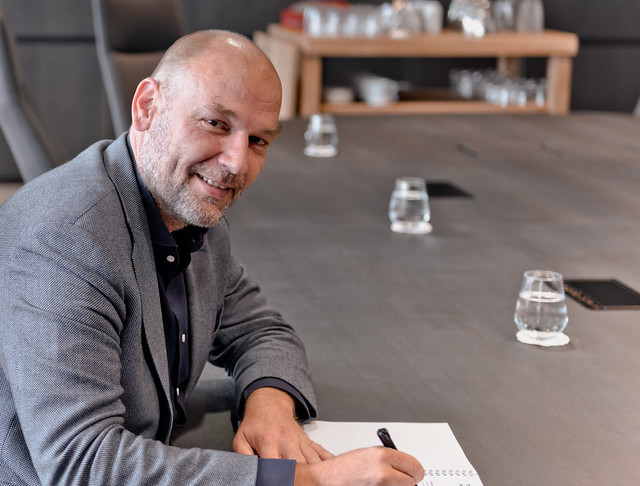Hard op weg naar een circulaire economie: Acts of the Region 2018
20 juni 2018 - Het thema circulariteit leeft. Dat bleek wel uit de opkomst in het knusse Amsterdamse restaurant LEUK tijdens het derde Circular Commitment event ‘Circulair Inkopen 1-2-3’, onderdeel van State of the Region 2018. Bedrijven, kennisinstellingen en overheden sloten zich de afgelopen periode massaal aan bij het Board-initiatief om samen de wereld te verduurzamen. Hoog tijd om de successen te vieren!
De basis van een milieuvriendelijke planeet ligt letterlijk en figuurlijk bij de grondstoftransitie. Aan de Amsterdam Economic Board de schone taak om alle partijen in de Metropoolregio Amsterdam (MRA) mee te krijgen. Dat leverde in anderhalf jaar tijd al prachtige samenwerkingen op, waarvan de waarde absoluut in geld uit te drukken is. De onthulling van dat bedrag werd de uitsmijter van het event, compleet met grote rode knop en bubbels.
Historische dag
Maar eerst het programma. Nadat iedereen al roezemoezend en handjes schuddend een plaatsje had gevonden met #SOTR2018 in de aanslag, leidden Board-leading ladies Jacqueline Cramer en Marjolein Brasz – toevallig beiden in een rood jurkje gestoken – de aanwezigen door de agenda heen. Brasz noemde het een historische dag: ’10 Bedrijven, overheden en kennisinstellingen tekenen vandaag 19 commitments tot circulair inkopen en in de coulissen staan nog veel meer partijen te trappelen! Ook 32 wethouders, 2 gedeputeerden en de vervoerregio tekenden vlak daarvoor een stevige Intentieverklaring Circulair Opdrachtgeverschap en Inkopen.’
Alle reden tot een feestje dus. Maar waarvoor zaten we hier nou precies met z’n allen? Cramer lichtte eerst nog eens de filosofie achter circulair inkopen toe. ‘Een transitie naar een circulaire economie gaat sneller als opdrachtgevers inkopen en productketens circulair gaan inrichten: dat geeft een signaal af aan de markt. Bedrijven krijgen zo de garantie dat circulair denken loont én blijft!’
En dat vergt een flinke omslag. Daarom zette de Board binnen de regio zogeheten ‘communities of practice’ op, waar overheden, bedrijven en kennisinstellingen samen konden leren, brainstormen en nadenken over het creëren van draagvlak voor circulair inkopen en concrete inkooptrajecten.
‘Ik snap er niets van!’
Tijd voor wat ervaringen uit de zaal. Na een opzwepend betoog van John Nederstigt, wethouder gemeente Haarlemmermeer, en voorvechter van het eerste uur, klonk ineens een vrouwenstem: ‘Ik snap niets van dat circulair inkopen. Er zijn zo veel beren op de weg!’ Het duurde een paar tellen voor men doorhad dat dit niet echt een bezorgde inkoper was, maar de opening van een sketch, waarin alle clichés, haken én ogen van circulair inkopen op hilarische wijze de revue passeerden.
Toen iedereen was uitgegrinnikt was het aan de tien organisaties om met een oversized rode pen hun krabbel onder de circulaire inkooptrajecten te zetten, al dan niet na een kort interview met de dames over de invulling.
Inspirerende voorbeelden
En inderdaad, er gebeurt van alles. Niet verzanden in bureaucratische toestanden, maar er als de kippen bij zijn, is het devies. Zo kijkt de Gemeente Zaanstad af bij Amsterdam hoe zij ICT-apparatuur kunnen hergebruiken en besteden ze hun meubilair circulair aan. Schiphol zet een tender in de markt displays as a service aan te besteden, zodat de displays in handen blijven van de leveranciers wat zorgt voor langere levensduur en het hergebruik van grondstoffen door de leverancier na gebruik. De Universiteit van Amsterdam werkt met dienstfietsen en circulair kantoormeubilair. Bedrijfskleding (Meerlanden) en tuinonderhoud (Nova College) blijken zich ook uitstekend te lenen voor een circulaire benadering. Bewegwijzering (Regio Gooi en Vechtstreek) kan prima worden gemaakt van biocomposiet. Gebouwelementen krijgen een materiaalpaspoort, de bouw van bruggen (Provincie Noord Holland) wordt ‘gelegoliseerd’ (conceptmatig bouwen, wat 15% kostenbesparing oplevert) en een heel gebied wordt circulair ingericht, Bijlmer Bajes (water, materialen, energie). Bijzonder inspirerend, vinden ook de toehoorders.
Rode knop: EUR 150.088.600!
Na de vraaggesprekjes en krabbels verzamelden alle partijen zich op het podium en werd de grote rode knop erbij gehaald. Want voor hoeveel euro’s aan toegevoegde waarde was er net getekend? Het scherm achter het gezelschap onthulde een bedrag van maar liefst 150.088.600 euro. Vervolgens werd er plaatsgemaakt voor de MRA-wethouders en gedeputeerden die de Intentieverklaring Circulair Opdrachtgeverschap en Inkopen hadden getekend:
10% circulaire aanbestedingen in 2022, minimaal 50% in 2025 en zo snel mogelijk die 100%. Weer een podium vol: fotomoment!
Tot slot werd het handelingsperspectief gepresenteerd, want ook het inspireren en begeleiden van zoveel mogelijk andere organisaties om mee te doen met de circulaire inkoopbeweging is onderdeel van het event. Zo geeft de Board met de campagne circulair 1-2-3 praktijkvoorbeelden om van te leren en kunnen bedrijven en kennisinstellingen zich aansluiten bij de Community of Practice Circulair Inkopen #3 (beide via de Board), de MRA Werkgroep Circulair Inkopen en opdrachtgeverschap voor overheden (via MRA Grondstoffenregisseur Jolein Baidenmann). En tot slot, de Rijksoverheid wil dit jaar een extra impuls geven aan circulair en klimaatneutraal inkopen; o.a. door de start van diverse leernetwerken. Er zijn leernetwerken voor productgroepen als bouw/gww, ICT of bedrijfskleding; en over doorkruisende onderwerpen zoals interne organisatie en schaduwprijzen. De leernetwerken zijn toegankelijk voor publieke organisaties; private organisaties kunnen meedoen mits ze deelnemers zijn aan de green deal circulair inkopen.
Daarna kwamen de glazen prosecco tevoorschijn, proost op de vooruitgang!
In de media
Tekst: Jessica Numann
21 juni 2018
Meer weten over
Neem contact op
Blijf jij ook op de hoogte?
8x per jaar nieuws en events uit de regio: schrijf je in voor de Board Update nieuwsbrief
Deel dit artikel
Wil je op de hoogte blijven?
Volg ons dagelijks op LinkedIn en schrijf je in voor de Board Update nieuwsbrief.
Lees ook deze berichten
- Een nieuwe lichting gedreven jongeren is aangetreden bij Young on Board, de ...
- Met de selectie van vier kanshebbers is de regionale voorronde van de ...
- Met meer dan 80 ondernemers, 40 investeerders en diverse dienstverleners bood LSH Capital Match ...


